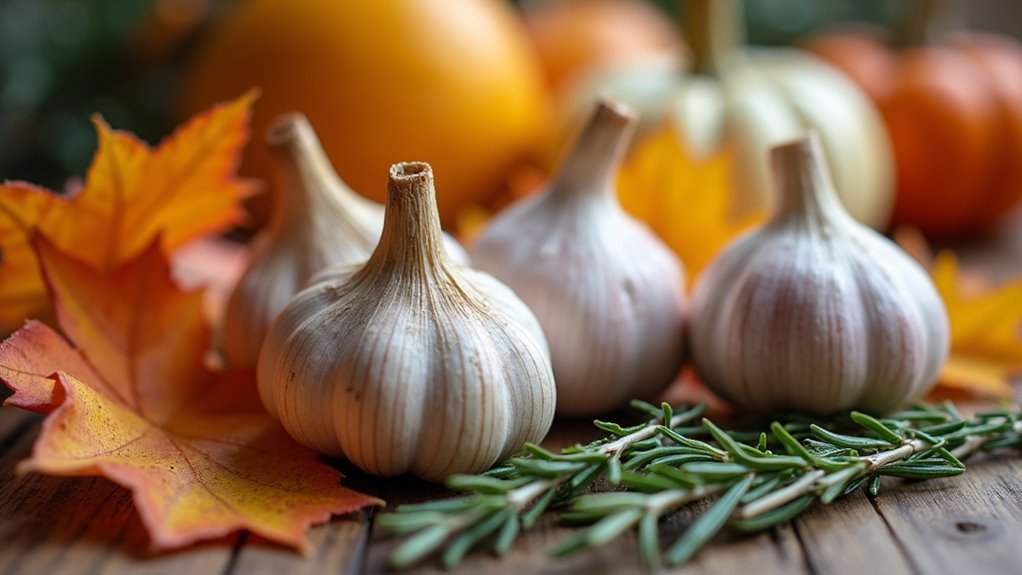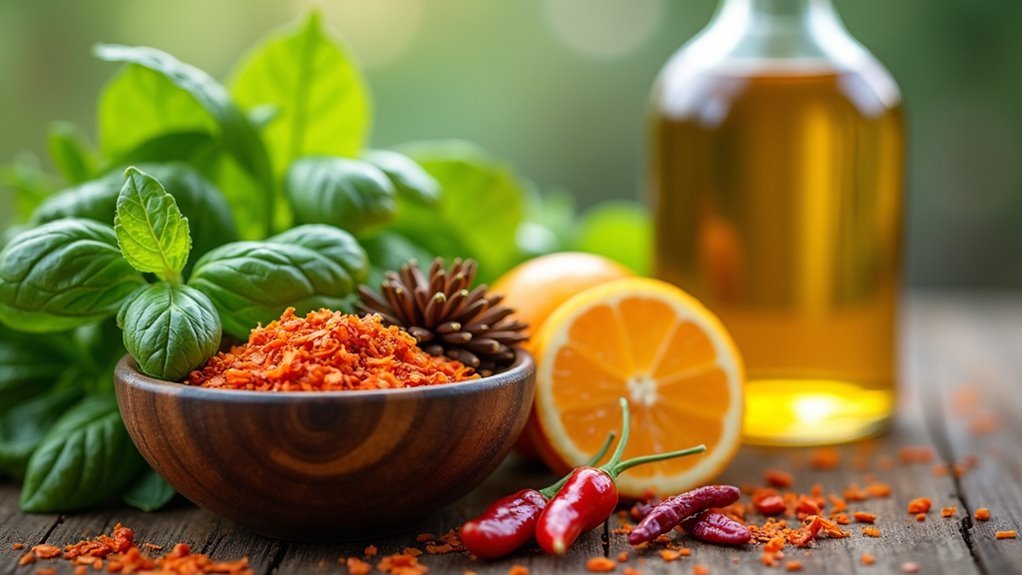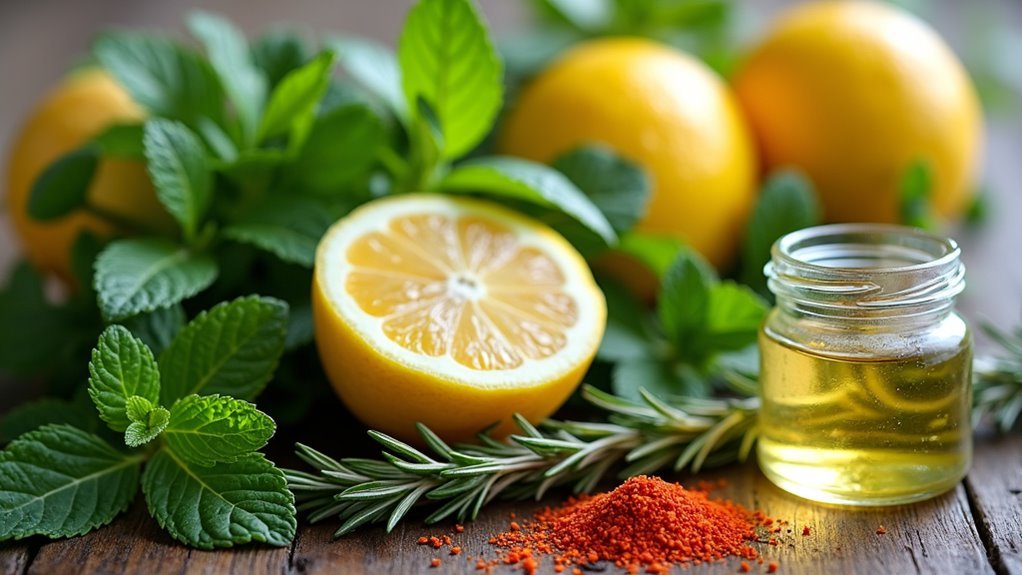You’ll achieve the best spider control by timing your ingredients with seasonal peaks: spring peppermint oil reaches maximum potency with 90% effectiveness, summer citrus peels provide fresh deterrent oils, fall garlic harvest delivers peak sulfur compounds, and winter essential oil blends create powerful indoor barriers. Combine these with year-round vinegar solutions and herb garden harvests of basil, mint, and lavender for extensive protection. Each season offers unique advantages that’ll transform your spider prevention strategy.
Spring Peppermint Oil: Peak Potency for Spider Control

As spring arrives and spiders emerge from their winter hideouts, peppermint oil reaches its peak potency, making it your most powerful natural spider repellent against unwanted eight-legged visitors.
The oil’s active compounds, particularly menthol, overwhelm spiders’ sensory receptors and create an effective barrier.
You’ll achieve ideal results by creating a DIY spray that combines peppermint oil with water and dish soap.
Focus your application around entry points like doorframes, windowsills, and basement corners where spiders typically establish habitats.
Research shows this natural spider repellent can repel spiders with up to 90% effectiveness when used consistently.
For effective spider control throughout spring, you’ll need to reapply your peppermint spray every few weeks as the scent naturally dissipates in warmer temperatures.
Summer Citrus Peels: Fresh Ingredients for Natural Deterrents
As summer arrives, you’ll want to harness the natural spider-repelling power of fresh citrus peels from lemons and oranges.
You can extract the potent oils by steeping peels in water for several hours, then transferring the infused liquid to a spray bottle for easy application.
Alternatively, you can place the peels directly in corners, windowsills, and other spider-prone areas where they’ll serve as both physical barriers and aromatic deterrents.
Citrus Oil Extraction Methods
When summer citrus fruits reach their peak ripeness, you’ll find that their peels contain the highest concentrations of d-limonene, the natural compound that makes spiders retreat from treated areas.
Extract citrus oil from these natural ingredients to create powerful, non-toxic spider spray that’ll effectively repel spiders throughout your home.
Here are four simple extraction methods:
- Dried peel infusion – Dry citrus peels completely, then steep them in carrier oil for concentrated extraction.
- Fresh blend method – Blend fresh citrus peels with water, strain thoroughly, and use immediately.
- Water infusion – Soak dried peels in hot water overnight for lighter concentration.
- Direct application – Rub fresh peels directly on surfaces where spiders enter.
These extraction techniques transform seasonal waste into effective pest control while maintaining pleasant indoor aromas.
Peel Application Techniques
Once you’ve extracted citrus oils using the methods above, you’ll need to apply them strategically to maximize their spider-repelling effectiveness.
Create your spider spray by blending fresh citrus peels with water, then strain the mixture thoroughly. Apply this natural deterrent around entry points like windowsills, doorframes, and cracks where spiders typically enter your home.
You can also place fresh citrus peels directly in problem areas. The natural oils release strong scents that disrupt spiders’ sensory receptors, making these spaces uninviting.
Focus on corners, basements, and storage areas where spiders commonly nest.
To maintain an effective deterrent, refresh your citrus peels and spray mixture regularly. The potency diminishes over time, so replacing them weekly guarantees you’ll continue to repel spiders successfully throughout the summer months.
Fall Garlic Harvest: Creating Powerful Spider Repellent Solutions

You’ll find fall’s garlic harvest offers one of nature’s most potent spider deterrents, with fresh cloves containing peak sulfur compounds that spiders can’t tolerate.
Start by pureeing four fresh garlic cloves and letting the paste infuse in water for 24 hours before adding dish soap to create your spray solution.
Apply this mixture every two weeks around entry points and spider-prone areas to maintain maximum effectiveness throughout the season when spiders actively seek indoor shelter.
Fresh Garlic Extraction Methods
Fall’s garlic harvest brings forth one of nature’s most potent spider deterrents, packed with sulfur compounds that naturally repel these eight-legged intruders.
Creating your own fresh garlic spider repellent through simple extraction methods provides an eco-friendly solution that’s safe around children and pets.
Here’s how you’ll extract garlic’s spider-fighting power:
- Puree four fresh garlic cloves into a smooth paste.
- Infuse the paste in water for 24 hours.
- Strain the mixture to create concentrated garlic solution.
- Mix with water and dish soap for spray application.
The extraction process releases sulfur compounds that disrupt spiders’ sensory receptors.
Apply this natural spray around entry points and spider-prone areas, reapplying every two weeks for maximum effectiveness against unwanted arachnid visitors.
Seasonal Application Timing Tips
As autumn temperatures drop and spiders seek warm indoor shelter, timing your garlic spray applications becomes essential for maximum protection.
You’ll want to harvest fresh garlic during fall’s peak season, when its natural compounds are most potent for creating effective repellent solutions.
Apply your garlic spider spray every two weeks throughout autumn, focusing on entry points like doorways, windows, and cracks where spiders typically invade.
This seasonal approach to pest control works because you’re intercepting spiders before they establish indoor territories.
Reapplication timing matters—don’t wait longer than two weeks, as garlic’s effectiveness diminishes over time.
Winter Essential Oil Blends: Indoor Spider Prevention Recipes
Winter months bring unwelcome eight-legged guests indoors, but essential oils create powerful barriers that keep spiders from settling into your warm home.
These peppermint oil and eucalyptus oil blends make effective homemade spider spray solutions for indoor spider prevention.
Try these proven winter spider repellent recipes:
- Basic Peppermint Spray: Mix 5-10 drops peppermint oil with 2 cups water and 1 tablespoon dish soap for strong scent deterrence.
- Tea Tree Barrier Blend: Combine 3 tablespoons Dr. Bronner’s Tea Tree Oil Soap with 5 drops eucalyptus oil in a spray bottle.
- Enhanced Aromatic Mix: Add lavender and cinnamon essential oils to any base recipe for pleasant fragrance plus extra deterrent properties.
- Application Strategy: Spray around windows and doors, reapplying every few weeks for continued effectiveness throughout winter.
Year-Round Vinegar Solutions: Consistent Seasonal Protection

While essential oils provide excellent seasonal solutions, vinegar offers reliable spider deterrence that works consistently throughout every season of the year. You’ll find this year-round approach incredibly effective when you mix equal parts white vinegar and water to create your spray solution.
| Season | Application Focus | Key Benefits |
|---|---|---|
| Spring | Entry points cleaning | Disrupts sensory receptors |
| Summer | Direct contact spray | Kills spiders instantly |
| Fall | Preventive barrier | Reduces population growth |
| Winter | Indoor maintenance | Safe for pets/children |
| Year-round | Consistent regimen | Long-term effectiveness |
You can prevent spiders by regularly applying this vinegar spray around windowsills and doorways. The acidic nature acts as a natural insecticide, making your environment uninviting for spiders while maintaining safety for your household.
Herb Garden Harvests: Basil, Mint, and Lavender Applications
Growing your own herb garden provides fresh, potent ingredients that’ll transform your spider control strategy throughout the growing season.
These aromatic plants serve dual purposes as culinary herbs and powerful natural repellent components for effective DIY spider repellents.
Here’s how to maximize your harvest for spider spray applications:
- Basil – Harvest leaves regularly and extract essential oils for homemade sprays, or plant near entry points for natural deterrence.
- Mint – Use peppermint’s overwhelming scent in spray formulations, but keep away from pets due to toxicity concerns.
- Lavender – Leverage linalool compounds by placing dried stems near entryways or incorporating essential oils into spray mixtures.
- Combination sprays – Mix all three herbs with water and dish soap for enhanced effectiveness.
Regular harvesting guarantees continuous pest control while maintaining plant productivity for ongoing natural spider management.
Seasonal Diatomaceous Earth Applications: Weather-Specific Usage
As seasons shift and weather patterns change, diatomaceous earth becomes your most versatile tool for year-round spider control when you time applications strategically.
During dry seasons when spiders are most active, you’ll maximize its dehydrating properties to prevent spider infestations effectively. Focus seasonal applications around spring and fall changes, sprinkling this natural powder around entry points like windows and doors to create protective barriers as spiders seek indoor shelter.
Apply diatomaceous earth during dry spring and fall seasons around entry points to maximize its dehydrating effects against invading spiders.
Moisture greatly reduces effectiveness, so you must reapply after heavy rain or damp weather.
Target active seasons by applying during early morning or late evening hours when spiders forage most actively. Consistent seasonal applications throughout the year guarantee continuous protection by disrupting spider lifecycles and eliminating their preferred habitats around your home.
Multi-Season Essential Oil Combinations: Maximizing Effectiveness
Creating powerful multi-season essential oil combinations transforms your spider control strategy into a year-round defense system that adapts to changing weather conditions and spider behavior patterns.
These DIY Spider Repellent blends leverage strong scents that disrupt spiders’ sensory receptors effectively.
Your essential oils arsenal should include these seasonal powerhouses:
- Peppermint oil – Mix 5-10 drops with two cups water and one tablespoon dish soap for monthly applications.
- Eucalyptus oil – Enhance your spider repellent’s potency by blending with other oils.
- Cinnamon and clove oils – Target seasonal variations during peak spring and fall spider activity.
- Dark glass storage bottles – Prevent oil degradation to maintain effectiveness across seasons.
This strategic combination approach guarantees your natural spider repellent remains potent throughout changing seasons.
Frequently Asked Questions
What Is the Best Homemade Spider Spray?
You’ll find the most effective homemade spider spray combines equal parts water and white vinegar with one tablespoon of dish soap per two cups, directly killing spiders on contact.
What Season Is Best for Spider Spray?
You’ll find spring’s the most effective season for spider spray application. As spiders emerge from winter hiding spots, you can prevent infestations before they’re established, creating barriers when spider activity peaks naturally.
What Are the Active Ingredients in Spider Spray?
You’ll find vinegar, essential oils like peppermint and tea tree, garlic, diatomaceous earth, lemon oil, and cinnamon work as active ingredients. These disrupt spiders’ senses, repel them, or kill on contact.
What Seasoning Kills Spiders?
You can use garlic, cinnamon, and paprika to kill spiders effectively. Garlic’s particularly potent when mixed with water as a spray. These seasonings disrupt spiders’ sensory receptors and create toxic environments for them.
In Summary
You’ll find success using seasonal ingredients year-round for spider control. Spring’s peppermint oil provides peak potency, while summer citrus peels offer fresh deterrents. Fall’s garlic harvest creates powerful repellents, and winter essential oil blends prevent indoor invasions. Don’t forget vinegar solutions work consistently across seasons, and your herb garden supplies natural options. Apply diatomaceous earth weather-specifically, and you’ll maximize effectiveness by combining multiple seasonal ingredients for thorough spider protection.





Leave a Reply